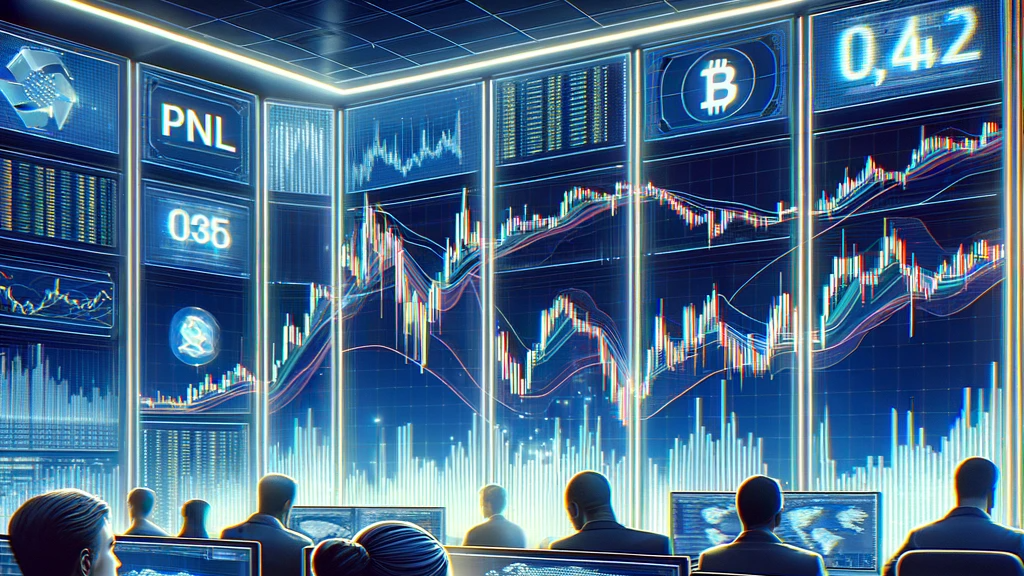9 months ago
What is DeFi in blockchain?

Ever felt like traditional banking systems are tying you down? As we dive deeper into the digital age, a groundbreaking financial movement is breaking away from the norm and taking the world by storm.
So, what is DeFi crypto all about? Imagine unlocking the chains of conventional finance and opening up a realm where boundaries blur, and possibilities are boundless. Buckle up, because we're about to embark on a journey, unraveling the tapestry of decentralized finance, and shedding light on its transformative potential. If you've been itching to wrap your head around this burgeoning phenomenon, you've landed in the right place!
Definition of Decentralized Finance (DeFi)
DeFi, a buzzword in virtual currencies, stands for Decentralized Finance. At its core, being "decentralized" means that the system operates without a central authority or middleman. Thus, DeFi represents a monetary web where transactions transpire word-for-word between parties.
Is DeFi Cryptocurrency?
Yes and no. Within the DeFi ecosystem, there are indeed cryptocurrencies, commonly referred to as DeFi tokens or DeFi coins. These tokens represent a user's interaction or stake in a particular DeFi application or protocol. For instance:
- MKR is the governance token for MakerDAO, a DeFi platform that allows users to mint the stablecoin DAI.
- COMP is the native token for Compound.
- UNI is the governance token for Uniswap, a decentralized exchange.
These DeFi tokens can be traded, held, or used within their respective ecosystems for various purposes, such as governance voting or earning rewards.
However, it's crucial to understand that while these tokens are indeed a form of cryptocurrency, DeFi is not.
What Is DeFi Protocol?
A DeFi protocol is a set of rules or guidelines embedded in smart contracts on a blockchain platform, primarily Ethereum.
Smart Contracts
Central to each protocol lies intelligent agreements, aka smart contracts. They have their stipulations encoded directly into their programming. Upon meeting predefined criteria, these agreements autonomously initiate and finalize designated operations.
Decentralization
Unlike traditional financial systems, protocols operate on a decentralized network. This means that no single entity has control over the system. Every change or upgrade is typically done through a consensus mechanism or governance model, often involving token holders.
Historical Background
The story of DeFi is intertwined with the rise and evolution of blockchain technology, particularly Ethereum.
Genesis
While Bitcoin, the first cryptocurrency, was a significant step towards decentralized value transfer, its primary function was limited to transactions. The need for a more flexible and versatile platform paved the way for Ethereum, the second-generation blockchain.
Initial Ripples
The foundational stone was set with the development of projects like MakerDAO. MakerDAO offered a decentralized lending system, allowing users to generate DAI (a stablecoin) by depositing Ethereum as collateral. This concept of over-collateralized borrowing became the archetype for numerous subsequent platforms.
Decentralized Exchanges (DEXs)
Centralized exchanges, which played pivotal roles in the early stages of cryptocurrency adoption, had several issues: they were vulnerable to hacks, mandated custody of user funds, and often required rigorous KYC checks.
Recognizing these challenges, developers started working on decentralized alternatives. Platforms like Uniswap and Kyber Network came to light, allowing for peer-to-peer exchange of assets without any intermediaries.
Yield Farming & Liquidity Mining
Around mid-2020, the term "yield farming" began trending in the crypto world. It's a system where users provide liquidity (usually in the form of cryptocurrency pairs) to a platform and, in return, earn rewards. Compound's governance token distribution was a notable event that popularized this phenomenon. This methodology provided an avenue for users to optimize returns on their assets, further pushing the boundaries of what it could achieve.
Financial Legos
One of the most enchanting aspects is the concept of composability, often likened to "money legos." This notion posits that various protocols can be stacked and intertwined like Lego blocks to create intricate financial structures and systems. This unique feature allows for innovation and diversified financial strategies, making DeFi a dynamic, ever-evolving sector.
Milestones and Setbacks
While it has had its share of milestones, it hasn't been without setbacks. Various platforms faced issues due to smart contract vulnerabilities, leading to significant losses. However, each challenge provided lessons, steering the community towards more robust, secure, and resilient platforms.
As the sun sets on each day, the world continues its relentless march forward, building upon the learnings of yesterday and innovating for a brighter, more decentralized tomorrow.
Key Principles of DeFi
- Open Access: Anyone can access platforms regardless of location or status.
- Transparency and Public Auditing: All transactions are recorded on a public ledger, ensuring clarity and trustworthiness.
- Global and Inclusive System: It transcends borders, offering a universal system.
- Programmability: Applications can be customized and automated.
- Interoperability and Composability: Different protocols can seamlessly integrate, creating a connected financial ecosystem.
How Does DeFi Work?
What is DeFi and how it works? Central to its functionality are Smart Contracts and DApps (Decentralized Applications). These automated contracts execute when certain conditions are met.
- Protocols: These range from lending platforms like Compound and decentralized exchanges (DEXs), to stablecoins pegged to traditional assets.
- Liquidity Pools and Yield Farming: Users can deposit their assets into pools and earn rewards. Yield farming amplifies this by optimizing returns.
Advantages of DeFi
The world of finance is undergoing a seismic shift, with DeFi leading the charge. The decentralized nature of this new financial system has brought forth advantages previously unattainable in the centralized world of traditional finance. Let's delve deeper into these benefits:
Unparalleled Accessibility
DeFi platforms are open to anyone with an internet connection. This inclusivity contrasts starkly with the conventional monetary landscape, where numerous individuals are excluded due to geographical barriers, lack of identification, or simply not meeting specific criteria set by centralized institutions. With DeFi:
- Global Reach: Whether you're in bustling New York or a remote village in Africa, as long as you have internet access, DeFi platforms are at your fingertips.
- Banking the Unbanked: Over a billion people worldwide lack access to traditional banking systems. DeFi bridges this gap, offering a new dawn of financial empowerment.
Cost-Efficiency Galore
By sidestepping intermediaries like banks, brokers, and agents, DeFi drastically slashes transaction fees. Here's how:
- Swift Transactions: With no need for third-party approvals, transactions, whether cross-border or local, are expedited.
- Reduced Fee Structures: The peer-to-peer nature of platforms often means diminished or even non-existent fees for certain operations, ensuring more money remains in users' wallets.
Transparency and Trust
In a DeFi ecosystem, transparency isn't just a buzzword—it's a foundational pillar. Every single transaction gets etched onto the blockchain, creating an immutable record.
- Open Audits: Many protocols are open source. This transparency allows for community-driven audits, ensuring accountability and minimizing foul play.
- User Sovereignty: Users maintain control of their funds at all times, fostering trust and minimizing chances of unauthorized access or misuse.
Programmability
It doesn't just introduce new financial tools; it redefines them. Its programmable nature allows for:
- Seamless Integration: Platforms, likened to "money legos," can effortlessly interlock with one another. This compatibility paves the way for a myriad of financial strategies and services.
- Tailored Financial Solutions: Developers can craft unique financial products and services catered to niche markets or individual needs, thanks to the flexible nature of protocols.
Challenges and Concerns with DeFi
- Smart Contract Vulnerabilities: Being digital, they're prone to bugs or hacks.
- Regulatory Hurdles: Decentralized Finance's decentralized nature poses challenges for regulatory frameworks.
- Price Volatility: Assets can experience drastic value fluctuations.
- Network Congestion: Popular platforms can face scalability issues, slowing down transactions.
Conclusion
As we navigate the labyrinth of modern finance, DeFi emerges as a beacon, heralding a future that melds innovation with inclusivity. It challenges the very core of traditional systems, beckoning a paradigm where finance isn't just an elite club but a global village. As DeFi continues its evolutionary journey, its profound impact hints at a future where financial autonomy is not a privilege, but a universal right. So, as we stand at the crossroads of history, it's worth pondering: DeFi might just be the financial revolution we didn't know we were waiting for.
Decentralized Finance is a testament to the transformative power of blockchain and digital assets. While challenges exist, its potential to revolutionize the financial landscape remains undeniable.
FAQ
Is DeFi different from crypto?
While crypto refers to digital currencies like Bitcoin, DeFi refers to financial platforms and protocols built using blockchain technology.
Is Bitcoin a DeFi or not?
No, Bitcoin is a cryptocurrency.
Is crypto DeFi risky?
Like all financial systems, Decentralized Finance has risks, including price volatility and smart contract vulnerabilities.
Is DeFi a coin or token?
DeFi itself isn't a coin or token. However, many platforms have their native tokens.
What is an example of a DeFi?
Uniswap, a decentralized exchange, and Compound, a lending platform, are prime examples of Decentralized Finance platforms.
Industry analysis
How are Cryptocurrency Hot Wallets Different from Cold Wallets
What is USDT — Tether coin meaning in cryptocurrency
How to Buy and Invest in Bitcoin
Cryptocurrency Security in 2024
Difference Between CEX and DEX in Crypto
What Is a Crypto Exchange
The Biggest Crypto Scams of All Time
Difference Between a Crypto Exchange And Broker
Accounting for Cryptocurrencies
Types of Cryptocurrency Wallets
Stay informed about the latest news on crypto
Subscribe to our newsletter.








